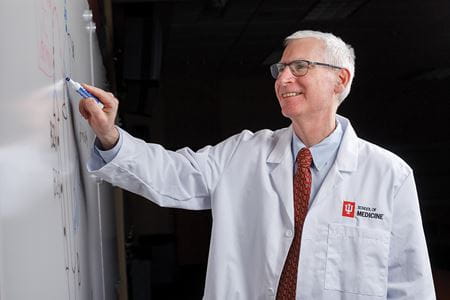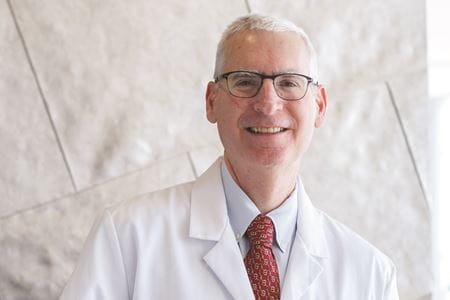It’s rare to find a world-renowned biomedical researcher who is also a foresighted yet steady leader. Michael Weiss, MD, PhD, MBA, is among the few. He built a team of experts in biochemistry and molecular biology at the Indiana University School of Medicine and launched the biotherapeutics program for IU’s Precision Health Initiative all while developing a “smart insulin” in his own lab that could be a game-changer for diabetes care.
“The technology and approaches Dr. Weiss brought and pioneered at IU have impacted so many of us seeking to develop novel therapeutics to treat a multitude of human diseases — me included,” said John Turchi, PhD, himself an internationally recognized investigator in DNA-damage response whose research has led to new directions for targeted cancer therapy.
As Weiss moves out of department leadership to focus on his research goals in the culminating years of his career, Turchi is stepping into leadership of the Department of Biochemistry, Molecular Biology and Pharmacology, which is a merger of Weiss’ former department and the Department of Pharmacology and Toxicology.
“His efforts brought new, cutting-edge approaches and technology to the IU School of Medicine for drug discovery and development,” Turchi said. “This expanded both the technological capacity and the intellectual innovation for approaching and thinking about drug discovery differently.”
In his — and the department’s — final meeting in October before the merger, Weiss gave valedictory remarks after nearly eight years as chair of the Department of Biochemistry and Molecular Biology. He spoke of the legacies of the late Peter Roach, PhD, a renowned diabetes and Lafora disease researcher, and the preceding department chair Robert A. Harris, PhD. As he lauded their personal and scientific excellence, many would agree that these attributes also describe Weiss: dedication and vision to solve an important problem in biomedicine, lifelong learning to adapt new technologies and advance the field, commitment to mentorship with “humane connections,” and someone who “lifted the spirits of peers and younger colleagues.”
As a productive and enthusiastic physician-scientist, Weiss led by example, Turchi said. “By maintaining a vibrant, robust laboratory while serving as chair, he demonstrated that a leader can be both an effective administrator and a high-achieving scientist, setting a high standard for research productivity,” Turchi said.
Recruiting early career experts for the future of biomedicine
Although Weiss is revered for his scientific innovation and rigor, he sees his greatest impact as a builder.
 When he was recruited to IU in 2017 from Case Western Reserve University — where he added an MBA to his MD and PhD degrees from Harvard — Weiss was tapped to lead not only the department but also the chemical biology and biotherapeutics program for the Precision Health Initiative — a $120 million investment by IU to discover and develop highly personalized treatments and cures for several diseases including multiple myeloma, triple negative breast cancer, childhood sarcoma, Type 2 diabetes and Alzheimer’s disease.
When he was recruited to IU in 2017 from Case Western Reserve University — where he added an MBA to his MD and PhD degrees from Harvard — Weiss was tapped to lead not only the department but also the chemical biology and biotherapeutics program for the Precision Health Initiative — a $120 million investment by IU to discover and develop highly personalized treatments and cures for several diseases including multiple myeloma, triple negative breast cancer, childhood sarcoma, Type 2 diabetes and Alzheimer’s disease.
“We were looking for junior faculty that could do high-impact, innovative science and methods development in their own labs as principal investigators and also be part of interdisciplinary teams with a (therapeutic) goal in the long run,” Weiss explained. “That meant we had to have a focus on collegial, interactive skills for team research.”
It was a search for rising stars in emerging fields. Weiss directed the acquisition of cutting-edge instruments and recruited experts in areas like nuclear magnetic resonance (NMR) spectrometry and the Nobel prize-winning technologies of cryo-electron microscopy (cryo-EM) and phage display, a laboratory technique for studying protein interactions used in immunotherapy. His department secured a multimillion-dollar federal grant to buy a high-powered electron microscope, called a 200 keV Glacios, housed at the IU School of Medicine in Indianapolis. Weiss then assembled a consortium including IU, Purdue University and the University of Illinois to purchase an even larger cryo-EM electron microscope housed at Purdue.
“We recruited one of the young superstars from Purdue, Qiuyan Chen, who’s an expert in applications of cryo-EM to G-protein-coupled receptors, which are the targets for more than half of all drugs currently approved by the FDA,” noted Weiss.
Chen is among a cadre of top-notch recruits in biochemistry and computational chemistry who will lead IU in important biomedical discoveries in the years to come, said Millie Georgiadis, PhD, who uses cryo-EM technology in her collaboration with Weiss, studying modified insulin molecules.
“The two major accomplishments of my chairmanship were bringing great young people here to blossom and bringing new technologies,” Weiss said. “Over the next year, I predict a tremendous uptick in NIH funding because of the foundation we laid.”
Jonah Vilseck, PhD, is one of Weiss’ recruits in computational biology. His lab develops computer simulations which can be used to guide drug discovery and novel therapies for a variety of infectious diseases. He also collaborates with investigators at the IU Melvin and Bren Simon Comprehensive Cancer Center with a goal to understand and address drug resistance in cancer.
Vilseck considers Weiss an exceptional department chair, colleague and mentor. “As my first chair, he provided outstanding support and created an environment where junior faculty could thrive and develop into independent scientists,” Vilseck said.
Alain Bopda Waffo, PhD, was recruited by Weiss in 2020 as an expert in phage display technology and took over for Weiss as director of the Chemical Genomics Core Facility, serving faculty investigators across several departments and fields.
“I admire Dr. Weiss’ background and determination to help bridge gaps between faculty and core services,” Waffo said. “Dr. Weiss fits everywhere — with students, staff, faculty and other leaders. He made things simple and impactful for everyone.”
Developing a better insulin
Weiss has always had an insatiable drive for discovery. His research focuses on intricate processes of glucose metabolism and insulin mechanisms of action — always with a goal to solve a big problem of human health. According to the Centers for Disease Control and Prevention (CDC), an estimated 38.4 million U.S. adults have diabetes.
 Weiss and his team of researchers recently discovered a new way to regulate blood glucose levels using a lab-designed “insulin-glucagon fusion protein,” possibly opening the door to a new treatment avenue for people with Type 1 diabetes. The protein signals the liver to naturally respond to a need for either insulin or glucagon. This research, supported by a grant from Breakthrough T1D (formerly JDRF), compliments his previous research developing a “smart insulin” that could respond to blood-glucose levels with a synthetic glucose-responsive “switch.”
Weiss and his team of researchers recently discovered a new way to regulate blood glucose levels using a lab-designed “insulin-glucagon fusion protein,” possibly opening the door to a new treatment avenue for people with Type 1 diabetes. The protein signals the liver to naturally respond to a need for either insulin or glucagon. This research, supported by a grant from Breakthrough T1D (formerly JDRF), compliments his previous research developing a “smart insulin” that could respond to blood-glucose levels with a synthetic glucose-responsive “switch.”
“So, we now have two shots on goal — chemical-smart or liver-smart insulin therapeutics — and they may both be important for patients,” Weiss said.
Weiss recently joined a second startup, Invictus Therapeutics, bringing together a skilled team of scientists, drug developers, physicians and manufacturing experts to transition technologies developed in his lab at IU into clinical use. Stepping down from his duties as department chair gives Weiss more time to focus on refining his discoveries and delivering these technologies to people living with diabetes, so they can think less about their disease and live longer, healthier lives.
“It’s such an exciting place to come to work every morning because of the cutting-edge science going on and its direct medical relevance,” Weiss said.
Georgiadis and Ronald Wek, PhD, both professors of biochemistry and molecular biology, are longtime collaborators with Weiss in insulin and diabetes research. They said his greatest contributions as department chair include generational renewal through the recruitment of innovative biochemists and computational chemists who will catalyze important biomedical discoveries for years to come.
He inspired this team of scientists to continually pursue innovations that will improve human health.
“Dr. Weiss is a world-renowned researcher who approaches administrative work from the perspective of an academic scientist,” Georgiadis said. “He fully understands that what unites our faculty is our love of science.”
